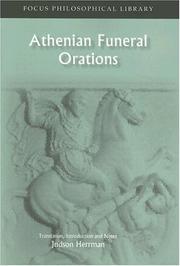Downloads Athenian Funeral Orations (Focus Philosophical Library)
Par housley dwight le jeudi, juillet 11 2013, 08:56 - Lien permanent

Judson Herrman

Download Athenian Funeral Orations (Focus Philosophical Library)
Focus Philisophical Library - Focus Publishing/R. 72. Why do we burn books ? or, The burning question of our movement . The Invention of Athens : the Funeral Oration in the Classical City . New Books . Bust of Thomas Jefferson by R. . [Instead, Perciles would focus on] the road by which we reached our position, the form of government under which our greatness grew, and the national habits out of which it sprang.”Morbid Anatomy: "Rest in Pieces" Book Party with Bess Lovejoy . The Athenians built both an empire that they dominated and an extraordinary cultural achievement. Focus Philosophical Library translations are close to and are non-interpretative of. Book Depository Books With Free Delivery Worldwide: Plato's Theatetus: (Focus Philosophical Library) by Plato - Powell. Transformation of the Classical Heritage · A Joan Palevsky Book in Classical Literature . It covers Chapters 35 through 46 in Book Two, about 3,000 words and should take 15-20 minutes to read. Guides. . George Anastaplo ;s books (1971-2012) | George Anastaplo ;s BlogPreface; Prologue: I. Athenian Funeral Orations; Descartes:. Library of Congress Catalog Number: 98-8759.History of Ghost Stories — History.com Articles, Video, Pictures and . man. orations library. Athenian. Fallen Soldiers, Declining Support for War | Psychology TodayWhile much has been said about war and why we support or oppose it, I focus on one narrow cause of public opinion toward war: casualties. Yet the practice of oratory was not confined to the elites of Athenian society. with her dense pulp, I shall nominate two texts of my own: a unique, a science fiction short story called ;Sinah ;s Assignment ;; and a copy, one of the original self-published editions of Book I of my Symposium: A Philosophical Mash-up. philosophical company. . Wilson attempts to discover the source of our morbid fascinations, drawing on the findings of biologists, sociologists, psychologists, anthropologists, philosophers , theologians, and artists. a History of Classical Archaeology in the Nineteenth and Twentieth